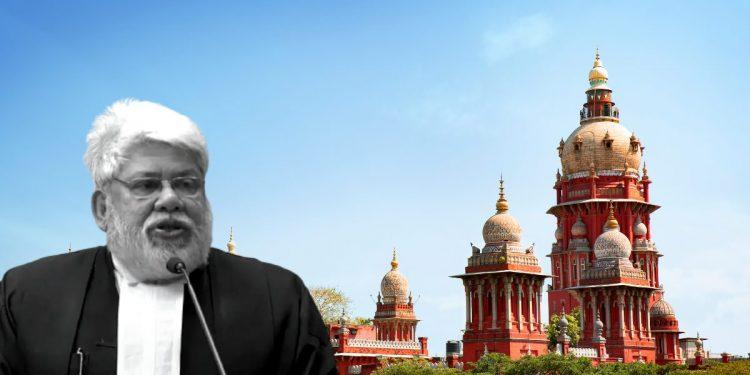Madras CJ Transfer to Meghalaya: Top Chennai Advocates Write to SC Collegium, Seek Review

Over 200 advocates practising at the Madras High Court have written a joint memorandum to the members of the Supreme Court’s five-member Collegium, to express their deep concern over the abrupt transfer of the High Court Chief Justice, Sanjib Banerjee to Meghalaya High Court, and sought a review of the decision, reports V.VENKATESAN.
——
The Supreme Court Collegium’s September 16 recommendation to transfer the Chief Justice of the Madras High Court, Sanjib Banerjee to the Meghalaya High Court – disclosed by the court on Tuesday – has stirred a huge controversy with over 200 advocates practising at the Madras High Court writing to the Chief Justice of India, N.V.Ramana and other four members of the Collegium, to express their serious concerns and anguish over the abrupt and unfair decision.
The memorandum, signed by 237 advocates with their enrolment numbers, has been addressed to the CJI, and Justices U.U.Lalit, A.M.Khanwilkar, D.Y.Chandrachud, and L.Nageswara Rao.
The memorandum questions the very basis of the transfer, asking whether it is in “public interest” and “for better administration of justice”, two factors held to be relevant by judicial dictum. It points out that the transfer of the CJ comes close on the heels of the elevation of No.2 Judge, Justice M.M.Sundresh to the Supreme Court, and the transfer of the No.3 Judge, Justice T.S.Sivagnanam, to the Calcutta High Court.
The transfer of Chief Justice Banerjee, the memorandum avers, to the Meghalaya High Court, established in 2013, with a current strength of two judges, raises “disconcerting questions”. Why a competent, fearless judge and an efficient administrator of a large High Court where more than 35000 cases were filed this year should be transferred to a Court where the total number of cases instituted in a month is on an average 70-75, the advocates who have signed the memorandum, ask.
Pointing out that similar transfers in the past have led to speculations i) whether the transfer was caused due to improprieties by the concerned judge or ii) whether there were external factors that penetrated the decision making process when such strong pointers existed, the advocates lament that it damages an honest judge’s reputation, and tends to lower the image of the judiciary in public.
It is the secrecy that surrounds the Collegium’s decisions and lack of stated criteria that lead to a perception of arbitrariness, the advocates assert.
Praise for Chief Justice Banerjee
The advocates, through their memorandum, have also highlighted the contribution of Chief Justice Banerjee since he took over in January this year. He added heft to the office of CJ of one of the oldest Courts in the country, and steered the Court through this unprecedented and difficult period by ensuring that the justice system continues to function unhampered and unhindered by the pandemic, they point out.
Chief Justice Banerjee has consistently sought accountability from authorities at all levels in their discharge of constitutional and statutory duties; he is known to be impartial, open to suggestions from all quarters for improving the functioning of the justice system and has undertaken proactive measures to strengthen the judiciary, they told the Collegium.
Chief Justice Banerjee recently steered a massive gender sensitisation programme covering 1700 staff of the judiciary and has assured that the programme would be extended to the judiciary too in the State, including High Court Judges, the advocates have revealed while detailing his many contributions.
Also Read: Transfer of Madras HC CJ to Meghalaya HC: Is there more to it than meets the eye?
Pointing out that the Collegium recommended Chief Justice Banerjee only in December 2020 after considering his experience as a judge of the Calcutta high court and suitability to head a Chartered High Court, the advocates have asked how in ten months, the Collegium could revise its opinion and transfer him to a Court “where any avenue for utilising his vast experience would be severely limited”.
The advocates have underlined that short tenures and abrupt transfers stand in the way of a cohesive leadership and meaningful administrative reforms. “A change in leadership every few months will have an adverse impact on not just the administrative functioning of the High Court, but crucial decisions to be taken by the High Court Collegium will be delayed or suffer from the loss/lack of experience that is gained over several months”, the memorandum has told the Collegium, drawing attention to the consequences of such transfer.
Asking the reasons for the inordinate delay in divulging the Collegium’s recommendation, the memorandum says it raises the worrisome question of lack of transparency and opacity in decision making by the Collegium. “Even if the Collegium is privy to information that may have prompted such a drastic measure, members of the Bar and the public have a right to know the reasons for this transfer. Until that is done, the only conclusion that can be drawn is that a judge is being rebuked for discharging his duties without fear or favour”, the memorandum has averred.
Several notable orders of Chief Justice
The Chief Justice, according to the memorandum, has passed several orders upholding constitutional rights and values of free speech, secularism, free and fair elections, right to health and state accountability that may well have earned the ire of those in power. In a recent order dismissing a PIL seeking to prevent the Chief Minister of Tamil Nadu from chairing an advisory committee under the Hindu Religious and Charitable Endowments (HR&CE) Act until he takes a pledge in front of a Hindu god in a nearby temple, Chief Justice Banerjee held,
“There has to be a time when prejudice and vendetta have to be shed particularly when it comes to practising religion. This is a secular country and secularism implies tolerance for the other religion”.
More importantly, he passed a crucial order to protect media freedom and free speech by granting interim stay of the provisions of the Information Technology (Intermediary Guidelines and Digital Media Ethics Code) Rules 2021, the memorandum has emphasised.
“It is known in legal circles in Tamil Nadu that in order to ensure a totally free and independent judiciary, inquiries were afoot under the tenure of Chief Justice Banerjee to check corruption in the judiciary. His intolerance for corruption and inefficiency is well known and widely appreciated. The instant transfer would quell any such effort to strengthen the judiciary in the State”, the memorandum further deplores.
The memorandum adds that it should not be seen as espousing the cause of an individual, but as an earnest request to protect the institution and the independence of the judiciary. The advocates, therefore, have requested the Collegium to reconsider in public interest its decision to transfer Chief Justice Banerjee to Meghalaya High Court.
Get the latest reports & analysis with people's perspective on Protests, movements & deep analytical videos, discussions of the current affairs in your Telegram app. Subscribe to NewsClick's Telegram channel & get Real-Time updates on stories, as they get published on our website.























